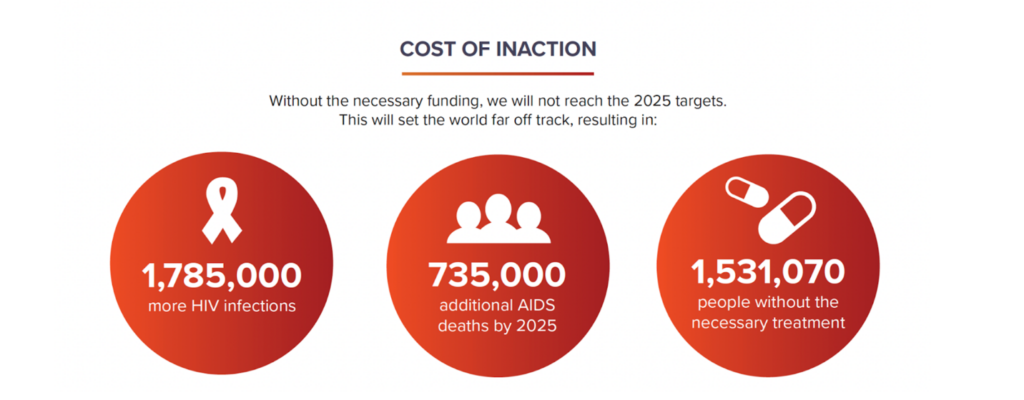GHLS Blog Series: Global AIDS Policy Partnership (GAPP)
The Global Health Landscape Symposium is just around the corner! This year’s convening will focus on generating progress and seizing on the potential of global health that has been so clearly illustrated throughout the COVID-19 crisis. We wanted to get a jump start on the conversation by talking to the organizations that will be joining us on December 7 and 8. Today, we are speaking with Suraj Madoori, co-chair of the Global AIDS Policy Partnership.
Tell us about your organization. What is your mission?
The Global AIDS Policy Partnership (GAPP) is a diverse coalition of over 70 organizations—including advocates, civil society and faith-based organizations, philanthropy, implementers, professional membership organizations, and NGOs—committed to expanding and improving U.S. global HIV/AIDS programming.
GAPP synthesizes data and feedback from its broad coalition of members, advocating for and influencing U.S. global HIV policy and funding decisions for the most evidence-based, effective, and well-funded AIDS response. GAPP ensures that the legacy of U.S. leadership in the fight against HIV and AIDS is understood, prioritized, and endures.
The last in-person Global Landscape Symposium took place in 2019, before the COVID-19 pandemic. What are the biggest challenges you and your organization have encountered in the three years since then?
Even before COVID-19, global HIV prevention goals were unacceptably off-target. Now, progress is further derailed by the pandemic and the resulting economic insecurity, unstable resources, and disrupted enabling environments. By way of example, for the first time in its history, the Global Fund reported that key HIV prevention and testing services declined in 2020.
Without immediate and aggressive action, we risk an escalation in new HIV infections, negative impacts on the lives of people living with and at risk for HIV, and squandering the substantive resources that have been dedicated to fighting the epidemic over the past 40 years. If we continue on this track, we will not be able to reach the global goal of ending HIV/AIDS as a public health threat by 2030. The cost of inaction in PEPFAR countries alone (shown below) would be devastating.

What are the most positive, encouraging developments that have emerged from this time period? Is there a particular example or story that illustrates this progress?
From the emergence of COVID-19 to the vaccine rollout, PEPFAR has been one of the most powerful tools used to mitigate the pandemic’s devastating impacts. Drawing on its two decades of expertise, diplomacy, and infrastructure, PEPFAR enabled the delivery of diagnostics, care, and vaccines to populations that may not otherwise have been reached. By quickly adapting to address the novel coronavirus, it proved what can be done with a strong framework and a whole-of-government approach. It has also shown its tremendous value as an asset in building systems to prepare for future health threats.
Much like HIV, COVID-19 has disproportionately harmed marginalized populations. PEPFAR has a long history of establishing trust across diverse sets of communities, breaking down barriers, and decreasing stigma to provide comprehensive services. The long-standing relationships it built through HIV programs helped to accelerate the response to COVID-19.
Tell us about your panel at the Symposium. What is the focus and why did you think it was important to discuss it at this convening?
The objective of our panel is to show that the HIV/AIDS response can be used as a case study for approaching pandemic preparedness through an equity lens. The COVID-19 pandemic was all-too-familiar for those of us who recall the early days of the HIV/AIDS response. The disproportionate impact on vulnerable populations, the stigmatization, and the challenges in reaching certain communities are consistent between the two diseases.
The HIV/AIDS response, in particular the Global Fund and PEPFAR, provide a blueprint for ensuring that we avoid these pitfalls when facing future pandemics. The ideals of social justice, respect, access, and dignity have been explicitly embedded in their strategies. Involving civil society, ensuring CSOs are represented on governing boards, and developing responsive programming to address equity concerns are all inherent to the ways PEPFAR and the Global Fund operate. As we continue to focus on pandemic preparedness, we would benefit from applying these best practices.
The title of this year’s Symposium is “Meeting the Moment.” How do you think the global health community can best meet this unique moment in time?
The most critical way to meet the moment is to be proactive versus reactive and ensure we have the resources we need to be successful. PEPFAR has been flat-funded for decades. The current investment of $5.4 billion mirrors investments made in 2009. With inflation, that effectively gives PEPFAR $1.5B less in purchasing power over the last 12 years. With 1.5M new infections each year, this funding level simply cannot meet the demand imposed upon the program to achieve its core mission, let alone support the prevention of, or response to, future pandemics.
With additional bilateral funding, PEPFAR could improve and expand upon programs that work, close the gaps in access to HIV/AIDS services, repair and rebuild programs that have been set back by COVID-19 and other global health crises, and make it over the plateau in prevention progress. The most recent data from UNAIDS sounded the alarm and our hope is that Congressional leaders will step up to safeguard decades of U.S. investments in HIV/AIDS and fill in gaps made by inequitable access to health services.
Is there anything else you’d like us to know?
There is really nothing this community can’t do when we work together. The HIV/AIDS response is a great example of facing a crisis head-on and making enormous strides. That’s why events like this Symposium are so important; the opportunity to come together and learn from one another is an opportunity for progress.
Be sure to attend GAPP’s Global Health Landscape Symposium panel, “A Foundation of Equity” on Thursday, December 8 at 1:45 PM.